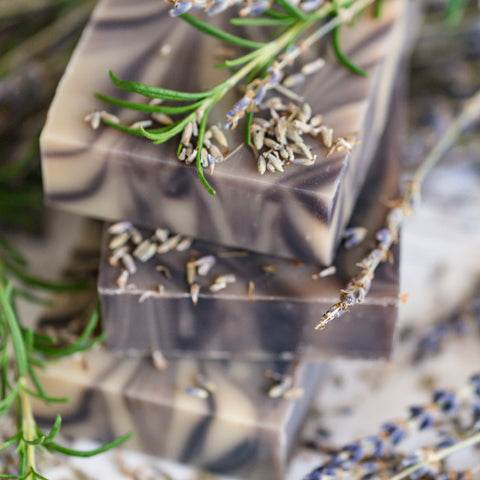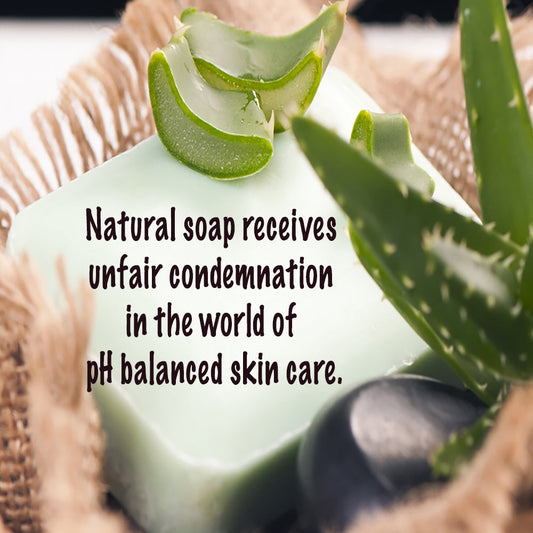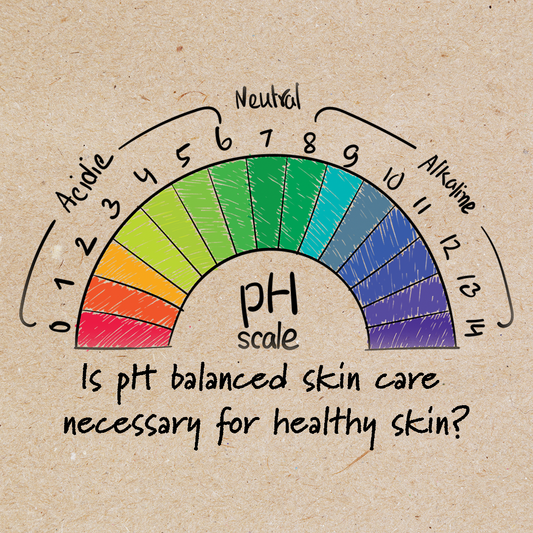What is a Syndet "Soap" or Shampoo?
We have received a few emails asking if we would make "natural" syndet shampoo bars. So, I began to realize that people did not understand the definition of a "syndet." Why?
Because there is no such thing as a "natural" syndet.
What is a Syndet?
Syndet is a blended word made by combining the words “synthetic” and "detergent." It is the name given to a cleansing bar or liquid made by the binding of synthetic detergents.

To create any type product that foams, lathers and cleans - for hair, body, or even dishes - a surfactant (surface-active agent) is essential.
Surfactants reduce the surface tension of water and bridge the gap between water and greasy dirt, allowing them to bind together and be easily washed away.
Detergents are surfactants. Soap is a natural surfactant, while detergents are synthetic surfactants.
Learn More Blog: How Does Soap Work?
Synthetic detergents (syndets) first emerged to address soap ingredient shortages caused by World War I. Scientists discovered a way to isolate lauryl alcohol from coconut fat or palm kernel oil, leading to the development of sodium lauryl sulfate (SLS). By the 1950s, syndets had surpassed traditional soap products in America, largely due to aggressive print, radio, and TV advertising. This marked the creation of a wide range detergents used for dishwashing, laundry, personal grooming, and hygiene.
The detergents used in syndets generally come from the sulfate family and can be derived from natural oils, fats, or petroleum products.
If the cleansing product you are using on your body or hair is labeled "soap-free" it is made using some type of synthetic detergent.
The word "syndet" bar sounds much better than a "synthetic detergent" bar and is more attractive to consumers who tend to shy away from synthetic skin care.
Although the word syndet may be new to many people, the first syndet-type bar, Dove, was introduced in 1955.
Why Are People Asking for Syndet Soap or Shampoo Bars?
People are asking for syndet "soaps" because they have been told they need pH balanced skin cleansers.
People are asking for syndet shampoo bars because they have been told that syndet bars work much better than soap-based shampoo bars and that they need pH balanced hair care.
Syndets vs Natural Soap?
Syndet soap bars are labeled and marketed with words like, “cleansing bar,” "body bar," or “beauty bar.”
These bars cannot call themselves "soap," because the word "Soap" has a legal definition provided by the FDA. Since syndets are made with synthetic surfactants they do not meet the legal definition of soap.

As consumers demand more and more natural and organic personal care products, a marketing war has developed between commercial and natural companies concerning pH balance skin care.
Learn More Blog: The War on Natural Soap
There is a lot of buzz about using pH-balanced syndet bars to go "soap-free."
The theory is that since they are less alkaline than a natural soap or shampoo bar, these synthetic detergent bars will not harm the acid mantle.
The pH Balancing Act
As we explore the concept of pH-balanced skin cleansers, let's examine the logic behind this trend.
Decades of research have consistently shown that all skin cleansing agents, including tap water, disrupt the skin's delicate acid mantle. (References "Effects of Soap and Detergents on Skin Surface pH in Infants" Dermatology 1997: "Acid mantle: What we need to know" Indian Journal of Dermatology 2023)
The skin's acid mantle, a protective layer on its surface, has a slightly acidic pH, ranging from 4.5 to 6.5. However, there really is no perfect skin pH since it can vary significantly due to numerous factors, including:
- Individual differences: Age, gender, skin type, and genetic predisposition.
- Body location: Different anatomic sites on the body have distinct pH levels.
- Skin secretions: The composition of an individual's sebum and sweat can influence skin pH.
- Skin health: Overall skin health and conditions like skin diseases or disorders.
Handmade soaps, crafted using the cold-processed method with natural ingredients, typically have an alkaline pH ranging from 8 to 10. This pH variation depends on factors such as:
- Type and proportion of oils used
- Amount of lye (sodium hydroxide) used
- Additional additives used
- Method of mixing and blending ingredients
- Curing time and conditions
Typically, the pH of tap water (well and city) ranges from 6.5 to 8.5.
 Now, let's consider the typical usage of a soap or cleansing bar:
Now, let's consider the typical usage of a soap or cleansing bar:
- Wet your skin with water
- Wet the bar with water
- Apply the bar to a wet washcloth or wet skin
- Add more water to create more lather
- Rinse off
So what happens when we use "the perfectly pH-balanced" skin cleanser with a pH of 5.3 (still not quite sure for whom it is perfectly pH balanced). When you mix this slightly acidic cleanser with the higher-pH water, its pH level will inevitably rise.
Conversely, the higher pH of a well formulated natural soap will be tempered by the lower pH of the water. Given the substantial amount of water used in bathing and showering compared to the amount of soap or shampoo, it makes sense that the pH of the water will ultimately influence the overall pH of the cleansing process.
So, is it just me, or does it seem counterintuitive that we are trying to match the perfect pH of someone's skin with a product that is instantly diluted with water and then immediately washed away with a lot of water, which has its own pH level?
Are Syndet Shampoo Bars Better Than Natural Shampoo Bars?
Syndet shampoo bars are made with synthetic detergents and some include artificial colors and synthetic fragrances similar to those found in liquid shampoos. In essence, syndet shampoo bars are concentrated liquid shampoos without the water and plastic packaging. They usually create a lot of foamy lather and come in fun colors and scents.
It makes sense that if your hair and scalp have adapted to and accepted as normal the ingredients in a bottled detergent shampoo, you may have little or no adjustment period to a detergent-based shampoo bar. That is the argument for using a syndet bar made by the companies that make them.

Some companies even call our bars "fake shampoo" because there is no "shampoo" in them. I guess that depends on whether or not your definition of "shampoo" must include synthetic ingredients.
Many of the new shampoo bars, marketed by the more "natural" companies have traded the more harsh surfactants like Sodium Lauryl Sulfate for Sodium Coco Sulfate or Sodium Cocoyl Isethionate which are derived from coconut or palm oils.
Unfortunately, since there are no legal definitions for words such as "natural," "naturally sourced," "naturally derived," "derived from nature," "derived from natural," etc., these words can be highly misleading for even the savviest consumer. As a result, shoppers often believe they are purchasing a natural product when it may actually be closer to, or even completely synthetic.
Beware of Greenwashing. Although terms like "plant-derived" or "naturally derived" imply a connection to nature, these labels only confirm that the ingredient started out at some point from a plant source. The words do not account for how the plant is processed, how it is modified, or what is added before it reaches its final form.
In reality, "plant-derived" ingredients may undergo such a significant transformation, that they are far removed from their natural state.
There is a lot of debate about the safety of sulfates--and other synthetic ingredients. Companies that use these ingredients state, and even cite research to show, that these ingredients can be mild and safe. Companies who choose not to use synthetic surfactants often cite research to show, that these ingredients are linked to skin irritation, allergic reactions, and dermatitis. It is all very confusing and quite frustrating!
Companies who sell syndet bars state that new detergent surfactants are safer and milder than traditional surfactants like SLS. Sodium Lauryl Sulfate (SLS) has been used in shampoos since the 1930s and it took a long time to discover that it may not be the best option for our skin. So, how long will it take to discover that these newer, milder synthetic detergents are also not beneficial to our skin, our bodies, and our environment?
Obviously, we don't know what research will tell us down the road about these surfactants and I am not here to argue that point.
I am also not here to debate whether or not new detergent surfactants are less irritating, safer, or better than older sulfates and my intention is not to persuade you that all synthetic surfactants are evil. Ultimately the type of shampoo bar you choose for your hair care is up to you.
I highly encourage you to read the list of ingredients before making a decision. You can and should always do your own research in order to decide for yourself whether you want to use a particular ingredient in your home, for your family, or on your skin.
I will definitely agree that a syndet shampoo bar will behave more like a traditional bottled shampoo and will rinse cleaner in hard water.
But the question you must ask yourself is ... Why do YOU want to switch to a shampoo bar? If reducing plastic waste is your primary goal, then any plastic-free shampoo bar brand will help achieve this important environmental objective.
However, if you are seeking a genuinely natural alternative to traditional bottled shampoo, be aware that "soap-free" syndet shampoo bars, despite containing some natural ingredients, rely on synthetic detergents and are not natural shampoo.
There is also the push for using a pH balanced shampoo. My concerns about the necessity for the perfectly pH balanced shampoo are the same as those discussed for soap.
The Bigger Picture: Beyond pH Balance
The synthetic detergents and other synthetic chemicals used in syndet cleansing bars, liquids, shampoos can be irritating to the skin. Many syndets also contain preservatives, and synthetic colors and fragrances may can cause skin sensitivity. These chemicals can also harm the environment as they wash down the drain and enter our waterways.
 While Syndet bars may boast a neutral or slightly acidic pH, they still contain surfactants cleansing agents (surfactants) that will dissolve the natural protective oil layer on our skin or scalp as they clean. That is the whole purpose of surfactants.
While Syndet bars may boast a neutral or slightly acidic pH, they still contain surfactants cleansing agents (surfactants) that will dissolve the natural protective oil layer on our skin or scalp as they clean. That is the whole purpose of surfactants.
Sebum (natural skin oil) makes up an important component of the acid mantle, removing this fatty layer may make us feel clean, but aren't these fats an important part of our natural acid mantle protection?
Commercial skincare companies like to place all of the blame for skin problems on products that are not pH balanced.
I believe that it is more important for a cleansing product to be "formula balanced" rather than "pH balanced. The pH value alone does not determine whether a product is gentle, harsh, or even effective.
There are so many factors that contribute to the overall health of the skin, including skin type, lifestyle, environment, and genetics. By solely focusing on pH we overlook and neglect vital aspects that contribute to healthy, resilient skin.
Conclusion
Before everyone comments that I am a biased author, I will readily admit that it is true. I own an organic skin care company and firmly believe that synthetic ingredients have no place in personal care products. So yes, I am happily biased.
My argument is not against the importance of a healthy acid mantle. Our skin is a dynamic organ with vital barrier functions including the physical barrier, microbiome barrier, chemical barrier, and immune barrier. These barriers, that work together in a complex system to protect the body from infection and environmental damage, all rely on a healthy and intact acid mantle. So yes, the acid mantle is vitally important.
My concern lies in the skin care industry's manipulation of research and the disregarding any common sense. We are led to believe that a perfectly pH-balanced skin cleanser is essential for healthy skin.
But what does "pH-balanced" really mean? Is it balanced for me a 70 year old woman, my 36 year old daughter, my 45 year old son, my 79 year old husband, or my 10 year old granddaughter?
The most accurate test of a good mild soap or shampoo is how it feels on your skin or hair. A healthy body will balance the skin pH on its own. So, listen to your skin and trust it.
We have received countless emails and testimonials from individuals who have switched from "pH-balanced" synthetic soaps, body washes, or shampoos to natural alternatives, finally finding relief from itching, dry skin, eczema, and other skin and scalp issues. They may not be research subjects, but they are real people.
It is important to be an informed consumer, look beyond marketing hype and buzzwords, and understand the broader context in which pH and synthetic ingredients play a role in product efficacy and safety.
NOTE: I just want to mention another type of cleanser called a combar or combination bar. Although this word is not used much in the US, it is basically part soap and part syndet. When you see ingredients that contain words like sodium palmate (a soap surfactant) along with Sodium cocoyl isethionate (a synthetic surfactant) you are really looking at a combar! Many of the bars that we call syndets, like Dove, are really combars.

What is pH Balanced Skin Care?
Sodium Coco Sulfate: Is It Natural?
Are All Handmade Soaps The Same?
12 Reasons To Use Natural Soap
This blog was updated in August 2024


